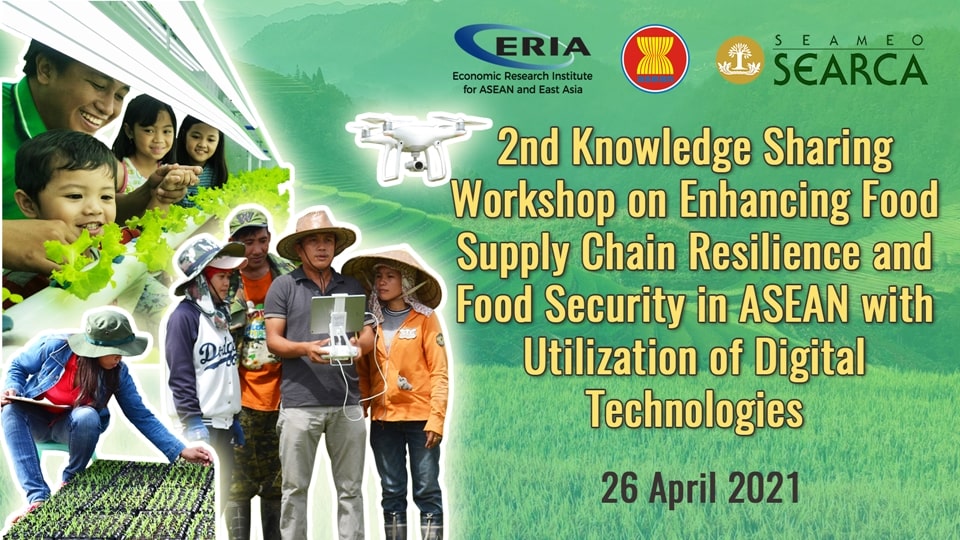To further gain insights for the development of ASEAN Guidelines for the Utilization of Digital Technologies for ASEAN Food and Agricultural Sector, the Southeast Asian Regional Center for Graduate Study and Research in Agriculture (SEARCA), the ASEAN Secretariat (ASEC), and the Economic Research Institute for ASEAN and East Asia (ERIA) organized a second online Knowledge Sharing Workshop with ASEAN Member States (AMS) on 26 April 2021.

The activity looks further into the experiences of ASEAN member states (AMS). It was also a platform to discuss their inputs and gather suggestions for the development of a set of guidelines to equip the ASEAN region with recommendations and implementation considerations for making informed decisions that will shape the digital transformation of agriculture in the region.
Experts also shared their experiences on the digitalization in the ASEAN agri-food sector and their various initiatives on smart agriculture. Dr. Paul Teng from Nanyang Technological University of Singapore (NTU) discussed the challenges of agricultural digitalization in AMS, including the uncertainty in business viability and scalability, limited freedom for farmers to operate with data across multiple data service providers due to prohibitive costs, and the gap in digital agriculture services among AMS.
Meanwhile, Dr. Masao Matsumoto from the Ministry of Agriculture, Forestry, and Fisheries of Japan (MAFF-Japan) highlighted their country's strategies to promote smart agriculture, including demonstrations and dissemination, support services to farmers, enabling environment, extension services, and overseas promotions.
 Dr. Paul Teng (left) and Dr. Dr. Masao Matsumoto (right) share their experiences on the digitalization in the ASEAN agri-food sector and various initiatives on smart agriculture
Dr. Paul Teng (left) and Dr. Dr. Masao Matsumoto (right) share their experiences on the digitalization in the ASEAN agri-food sector and various initiatives on smart agriculture
Dr. Nerlita Manalili, SEARCA's technical consultant, presented the conclusions of the survey on adopting digital technologies as well as the draft guidelines. A breakout session ensued to elicit additional recommendations. The group suggested including a thematic guide on the role of agricultural digitization on enhancing trade (traceability), resource protection and conservation, and research and development services. Addressing concerns of small and medium-sized enterprises and smallholder farmers on adopting digital technology was also deemed essential.
It was likewise pointed out that while there are already existing data platforms in AMS, data integration can further improve the interoperability of different platforms available within an AMS and across the region. They also noted that access to information is crucial in attracting stakeholders' action to support digital transformation in agriculture. Lastly, they emphasized the role of the private sector in promoting agricultural digitalization and the importance of engaging them in the initial stages of the planning process.
 Dr. Nerlita Manalili, Technical Consultant of the project (left) and Dr. Pedcris Orencio, Head of SEARCA's Research and Thought Leadership Department (right) lead the discussions on the results of the survey and draft guidelines.
Dr. Nerlita Manalili, Technical Consultant of the project (left) and Dr. Pedcris Orencio, Head of SEARCA's Research and Thought Leadership Department (right) lead the discussions on the results of the survey and draft guidelines.
Delegates from 10 AMS (Brunei Darussalam, Cambodia, Indonesia, Lao PDR, Malaysia, Myanmar, the Philippines, Singapore, Thailand, and Vietnam) from the four ASEAN sectoral working groups participated in the workshop. Representatives from Grow Asia, and International Rice Research Institute were also in attendance.
This initiative is under the "Enhancing Food Supply Chain Resilience and Food Security in ASEAN with Utilization of Digital Technologies" project. Currently, the team is revising the draft guidelines based on the recommendations from AMS, results of other project components, and the outcomes of the two Knowledge Sharing Workshops. It is expected to be completed in June 2021.









